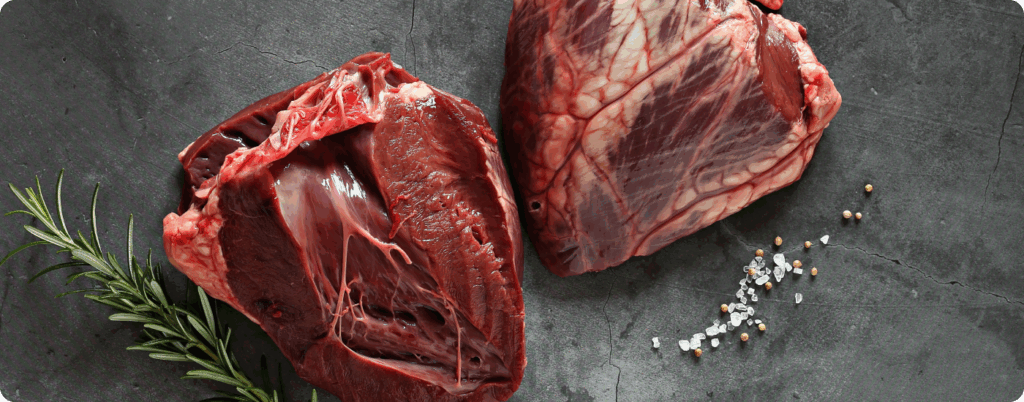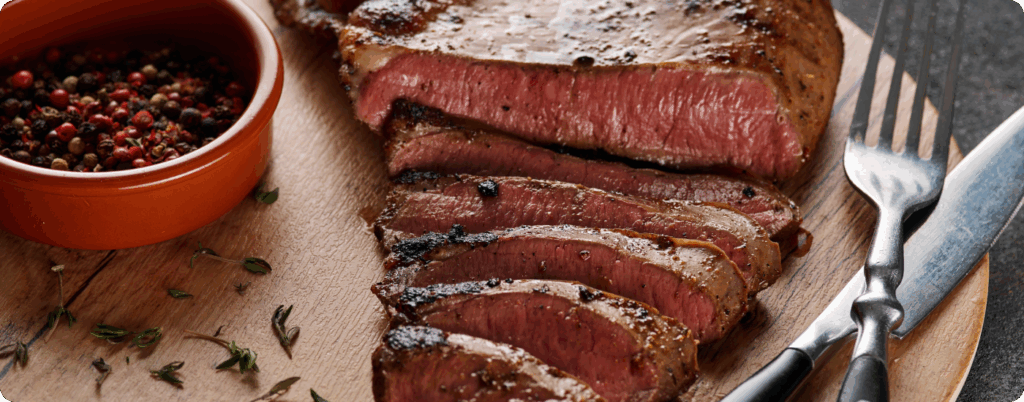PLEASE NOTE: The information in this blog is for educational purposes only. It is not a substitute for professional medical advice. Consult your healthcare provider if you’re seeking medical advice, diagnosis, or treatment.
When most people think of nutrient-dense foods, beef heart rarely comes to mind. Yet this underappreciated organ meat is one of the most concentrated sources of essential vitamins and minerals available.
While organ meats have fallen out of favor in modern Western diets, they’ve been prized for thousands of years by cultures around the world for their exceptional nutritional properties and flexibility.
Understanding the impressive nutrients in beef heart can help you make informed decisions about adding this valuable food to your wellness routine.
What is Beef Heart?
Beef heart is exactly what it sounds like—the muscular organ from cattle that pumps blood throughout the animal’s body.

Unlike skeletal muscle (the typical cuts of meat found at the grocery store), the heart is a smooth muscle with a denser texture and a richer flavor profile. This organ meat has been a staple in traditional cuisines worldwide, from Mexican dishes featuring various offal to Northeastern American recipes that incorporate organ meats.
Despite its nutritional advantages, beef heart and other organ meats often face an image problem in contemporary food culture. Many consumers find the concept of eating organs unappealing, which has limited their use in mainstream cooking.
However, the exceptional concentration of vitamins, minerals, and bioactive compounds found in organ meats makes them worthy of reconsideration, especially as we seek more nutrient-dense food sources in an era of declining food quality.
15 Powerful Nutrients in Beef Heart: What to Expect
Beef heart contains a remarkable array of vitamins, minerals, and specialized compounds that support various aspects of your health.
1. Protein
Beef heart can be an excellent option for boosting your protein intake, as it’s considered an excellent source of protein (1).
2. Vitamin B2
Riboflavin (vitamin B2) is also abundant in beef heart (2). Riboflavin functions as an antioxidant by helping regenerate glutathione, one of your body’s most important free radical scavengers (3).
3. Vitamin B3
Beef heart is an excellent source of niacin (vitamin B3), which is important for cellular protection, neuroprotection, nervous system function, and may reduce the risk of cardiovascular disease (4, 5, 6).
4. Vitamin B5

Vitamin B5, also known as pantothenic acid, is important for hormone synthesis, energy production, as well as skin, hair, and nail health (7). Beef heart is considered a good source of vitamin B5.
5. Vitamin B6
Another B vitamin found in beef heart and other organ meats is pyridoxine. Vitamin B6 is beneficial for cognitive function, immune function, and protein metabolism, and may reduce the risk of cardiovascular disease (8).
6. Vitamin B12
Vitamin B12 is found only in animal products. This essential nutrient supports red blood cell formation, DNA synthesis, and proper functioning of your central nervous system (9).
7. Vitamin K2
Another nutrient found primarily in animal foods like beef heart is vitamin K2. Research indicates that vitamin K2 may help prevent arterial calcification, support bone strength, reduce fracture risk, and improve insulin sensitivity (10, 11, 12).
8. Iron
Beef heart is also an excellent source of iron (13). The heme iron found in beef heart and other animal foods can assist with immune function, hormone synthesis, and energy metabolism (14).
9. Copper

Another key mineral found in beef heart is copper. Copper is involved in iron metabolism, neurotransmitter synthesis, energy production, and brain development (15).
10. Zinc
Zinc is important for wound healing, cell signaling, DNA synthesis, and immune function (16). A deficiency in zinc can lead to a variety of consequences, such as motor dysfunction, appetite disorders, and even anemia (17).
11. Selenium
Beef heart contains selenium, a trace mineral that serves multiple critical functions. As a component of selenoproteins, selenium acts as an antioxidant protecting against oxidative stress (18).
This mineral also serves as a cofactor for glutathione peroxidase, one of your body’s most important antioxidant enzymes.
12. Coenzyme Q10 (CoQ10)
Coenzyme Q10 (CoQ10) is a compound that is found in every cell membrane in the human body (19). This nutrient can lead to better energy production, mitochondrial function, exercise performance, and also has antioxidant properties (20, 21, 22).
Compared to other organ meats, beef heart is a rich source of CoQ10 (23).
13. Choline
Animal foods like eggs, dairy, organ meats, and fish are key sources of choline, as the body cannot produce enough on its own, and many people are not consuming enough of it (24). The human body requires choline for neurotransmitters impacting muscle control, mood, memory, and other brain functions.
14. Collagen
Beef heart is also a source of collagen (25). Collagen is vital for organ development, wound healing, cornea and scalp repair, immune system function, and blood vessel and bone reparation (26, 27).
15. Other Minerals
Beyond the major nutrients in beef heart already discussed, this organ meat contains several other important minerals such as calcium, magnesium, phosphorus, and manganese (28).
How to Add Beef Heart to Your Diet
Even with the impressive amount of nutrients in beef heart, it can still be a tasty and simple addition to your diet. These are the 3 most popular strategies to consider:
1. Beef Heart Recipes
Cooking with beef heart directly gives you complete control over preparation and flavor. This organ meat has a firm, dense texture similar to lean steak and can be prepared using various cooking methods.

Many traditional recipes around the world feature beef heart, from South American anticuchos (grilled heart skewers) to slow-cooked stews that showcase this organ’s rich, beefy flavor. Other potential beef heart dishes include:
- Beef Heart Stew
- Beef Heart Burgers
- Beef Heart Kebabs
- Beef Heart Chili
- Beef Heart Meatballs
When appropriately prepared, beef heart offers a taste that’s more intense than regular beef but not overly organ-like, making it an approachable option for nose-to-tail eating.
2. Organ Blends
Another popular method for adding organs to the diet is through blends. Companies such as Force of Nature offer an “ancestral blend” that consists of ground beef, beef liver, and beef heart.
Given the milder taste, organ blends can be a perfect introduction to organ meats.
3. Supplements
If cooking organ meats seems too daunting or time-consuming, beef organ supplements are a convenient and nutritious alternative.
Warrior is a popular option for those looking to include a beef heart supplement. Made with 100% grass-fed and grass-finished heart and liver, Warrior provides nutrients that have been shown to support muscle growth, recovery, and energy.

While supplements can’t fully replicate the experience and additional benefits of eating whole foods, they make the exceptional nutrients in beef heart accessible to anyone, regardless of cooking skills or taste preferences.
The Bottom Line: Don’t Forget About Beef Heart
The nutrients in beef heart make it one of the most nutritionally dense foods available. From its impressive B-vitamin profile to its rich content of bioavailable minerals and unique compounds like coenzyme Q10, beef heart delivers a concentrated package of essential nutrients that may support energy production, cardiovascular health, nervous system function, and overall vitality.
Whether you choose to explore traditional beef heart recipes, blend organ meats into familiar dishes, or opt for convenient supplements, incorporating the nutrients in beef heart into your dietary routine can help fill nutritional gaps and support optimal health.
As we rediscover the wisdom of traditional foodways that valued every part of the animal, beef heart stands ready to reclaim its place as a nutritional powerhouse worthy of a resurgence.
Subscribe to future articles like this: